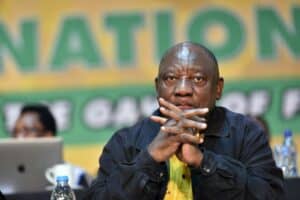These were investigations 'such as the R86 million blue lights tender involving former acting police commissioner Khomotso Phahlane'.

The National Prosecuting Authority (NPA) was allegedly reluctant to deal with Independent Police Investigative Directorate (Ipid) investigations that involved high-ranking police officials, the commission of inquiry into state capture heard on Wednesday.
“We raised issues that we believe the NPA was biased in taking some of these decisions not to prosecute. When we investigate low-ranking officers, we never get an interference, once it is generals then there is interference,” said Ipid’s national head of investigations, Matthews Sesoko.
“It shows, and there is a pattern, that there was that kind of a bias and unwillingness on the part of the NPA at that time to take our matters seriously,” he added.
Sesoko was referring to high-profile Ipid investigations such as the R86m blue lights tender involving former acting police commissioner Khomotso Phahlane, as well as investigations into how controversial businessman Thoshan Panday allegedly bought off police officials.
“In our view, there was never an intention to deal with these matters, even with the Panday matter, nothing happened. What is strange is that just before the judgment on the removal of [Shaun] Abrahams then the decision was made to prosecute without any new evidence being brought forward.
“The Panday matter had political connections, the other matters included high-ranking police officials – we’re talking generals,” he explained.
Sesoko revealed the watchdog had to go to court to interdict law enforcement from the North West from interfering with these high-profile investigations.
He said the NPA – including former national director of public prosecutions Shaun Abrahams – failed to provide legal reasons behind its decisions not to prosecute Ipid matters outside of the phrase “there is no reasonable prospects of success”.
“Where [forensic investigator] Paul O’Sullivan was a complainant, for example, two senior advocates in the NPA took a decision that officials from the Mabula team must be prosecuted and they wrote a memorandum.
“To our surprise, when the decision came, it came as declined to prosecute. When we questioned this, the response we got was we agree with the NDPP without giving us legal reasons, especially where senior advocates in that office said there was a case to answer here.”
Sesoko told the commission General Ntebo Mabula and his team – police officers from the North West – were brought in by Phahlane “under the pretence” of investigating a security breach at his home. However, they were allegedly there to interfere with high-profile Ipid investigations.
The commission’s chairperson, Deputy Chief Justice Raymond Zondo, pointed out part of the commission’s work included looking at “how the NPA advanced state capture by protecting certain people”.
“It may well be that the cases you are talking about could show what I am talking about, I would like you and your colleagues at Ipid to look at all those cases and see whether you are able to select all those that fall under our terms of reference where there was reluctance to prosecute and where there should have been a prosecution,” Zondo said.
“Will certainly do so chair because it is part of the submissions we made to the [current] NDPP advocate Shamila Batohi,” Sesoko said in response.
The inquiry continues on Thursday.
For more news your way, download The Citizen’s app for iOS and Android.






